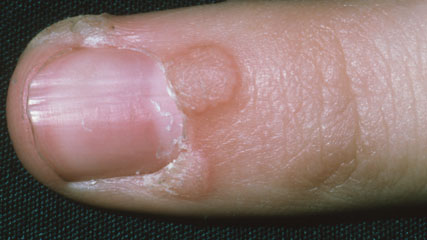 DD HEALTH WATCH: Warts are small bumps usually found on the hands or feet. They are caused by a viral infection in the skin.
DD HEALTH WATCH: Warts are small bumps usually found on the hands or feet. They are caused by a viral infection in the skin.
The virus causes an excess amount of keratin, a hard protein, to develop in the top skin layer (epidermis). The extra keratin produces the rough, hard texture of a wart.
Warts are benign (non-cancerous).
A verruca is a wart. However when warts are found on the feet, they are referred to as verrucas. Verrucas are also known as plantar warts.
Warts are usually skin coloured and have a rough texture. They are cauliflower shaped. Warts are often found on the hands, around the nails or on the fingers. However they can appear anywhere on the body.
Verrucas are most commonly found where the foot is exposed to pressure, for example, on the ball of the foot. They can be painful because of the constant pressure on them caused by standing and walking.
Verrucas tend to appear flat with thick skin. They usually have a hard edge around a softer centre. Sometimes black spots can be seen inside the warts. These are caused by bleeding in the verruca as a result of pressure caused by standing and walking on them. They can look quite similar to corns.
Verrucas are often associated with swimming pools. When a person with verrucas walks in their bare feet, the virus that caused it is released onto the floor. If other people then walk on this, they may become infected. A person who has any kind of cut or scratches on their feet is particularly vulnerable to verrucas.
When people are exposed to the wart virus, some develop warts or verrucas, while others seem immune to them. It is not known why some people are more susceptible to warts than others.
It can take months for warts to develop after the initial infection.
If you have a verruca, visit your doctor to find out what the best course of treatment is. Verrucas, whether a cluster or just one, can be very painful and may require treatment to stop them spreading.
Children who have verrucas can find that, like warts, they may spontaneously disappear over time. If treatment is not necessary, they can be covered for activities such as swimming. Ask your GP whether treatment is advisable.
Warts do not always need medical treatment because they are benign and many of them spontaneously disappear after one or two years.
Warts can go away by themselves, only to come back at a later time. Even if they are medically treated, they can return. Sometimes they don’t return until years later
Most types of warts are easy to identify because they have a distinctive appearance. You should always see your GP if you have a growth on your skin you are unable to identify or are worried about.
Your GP will be able to tell if it’s a wart simply by looking at it. Where it is on your body and how it affects surrounding skin will also be taken into consideration.
You should visit your GP if you have a wart that:
- bleeds
- changes in appearance
- spreads
- causes you significant pain, distress or embarrassment
Treating warts
Most warts are harmless and clear up without treatment.
The length of time it takes a wart to disappear will vary from person to person. It may take up to two years for the viral infection to leave your system and for the wart to disappear.
You might decide to treat your wart if it is painful, or in an area that is causing discomfort or embarrassment.
Common methods of treatment include:
- salicylic acid
- cryotherapy (freezing the skin cells)
- duct tape
- chemical treatments
Treatment for warts is not always completely effective, and a wart will sometimes return following treatment.
Surgery is not usually recommended for warts.







